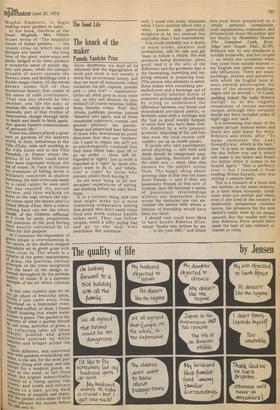The Good Life
The knack of the maker
Pamela Vandyke Price Soon, doubtless, we shall all be informed that the ingurgitation of nosh and slosh is not merely a sinful but an economic luxury, and that we must all henceforth refuel ourselves via pill, capsule, powder and — why not? — suppository. (After all, what goes in must come out, so why not shorten its stay within?) Of course sweeties, lollies, lbuns, biscuits, crisps; `fruit' (sic) drinks, puddings, pastries, canned 'desserts' (sic) again, and all these sweetened yoghourts, creams, and general potionry, the pseudo'bread and plasticised beer beloved of those who, bewildered by union directives that they are `workers' (do I need to repeat the sic?) are so psychologically confused that they must either take time off or go on strike these will be regarded as 'rights,' just as work is regarded as a `right' by those who don't want to do it, and 'education' a 'right' by those who prevent others from having it.
So we must bung in all our decadent experiences of eating and drinking before we can't have them. It is a curious thing and one that might make for a most interesting comparative tasting that people who don't really enjoy food and drink cannot handle either well. They can follow recipes, wield a nifty piping bag and go to the best wine
merchants. But somehow
well, I could cite many instances when I have puzzled about why a • wine, known and previously delighted in by me, seemed less ■ enjoyable than I had remembered.
You could probably put a dozen or more cooks, amateur and professional, side by side and get them to follow a recipe, the end products being dissimilar, albeit good. And it is the why of the difference and the goodness that is the fascinating, humbling and inspiring element in preparing food. [(The person who attempts to enter these stakes with everything premulled-over and a beverage out of some fancily-labelled bottle of unknown provenance should start by trying to understand the difference between real bread and steambaked pre-sliced plastic, or between wine with a heritage and the 'just as good' weekly bargain of some firm who have been craftily diddled by a wily peasant producer, disposing of his odd lots that even the local tourist café couldn't use up as carafe plonk). If people who care passionately about anything — and food and drink should be categroised with music, painting, literature and all the other arts — meet, then this passion for the subject unites them. The happy thing about growing older is that one can have more friends — and if they are passionate friends in this sort of context, then life becomes a series of passionate relationships without any heartaches. Even across the centuries one can encounter the person with whom a lifetime of friendship would have been too short.
I should very much have liked to have known Rebecca Price, whose "booke was written by me in the yare 1681," and which has now been presented as a wholly personal compilation, with explanations, comments, and informations about the author and her family, by Madeleine Masson (The Compleat Cook, Routledge and Kegan Paul, £5.50). Rebecca was by any standards a notable housewife, and her recipes — on which she comments when they come from outside sources — are English but admit many outside influences. There are many puddings, pickles and preserves, with which the English have always seemed preoccupied, but some of the savoury puddings might well be revived "A Carett pudding baked: My Lady Howe's; receipt" is, to me, vaguely reminiscent of certain wartime recipes, although they certainly would not have included yolks of eight eggs and 'sack.'
It is interesting that many of the recipes include various wines and there are also many for wine. Rebecca also notes, after "To make chocolate the Lady Howard's way: which is the best," that "it is best to make chocolate the day before you use it which will make it the thiker and froath the better when it comes to be heated again." This is perfectly true — but I learned it from reading Brillat-Savarin, who was writing a century later.
This is a treasure of a book and one written, as the notes indicate, at a time when economic conditions were not settled and when, even if one lived in the country in moderately prosperous circumstances, the prospects for the next month's meals were by no means assured. But the reader will feel that Rebecca Price would have made the best of any culinary situation or crisis.


































 Previous page
Previous page